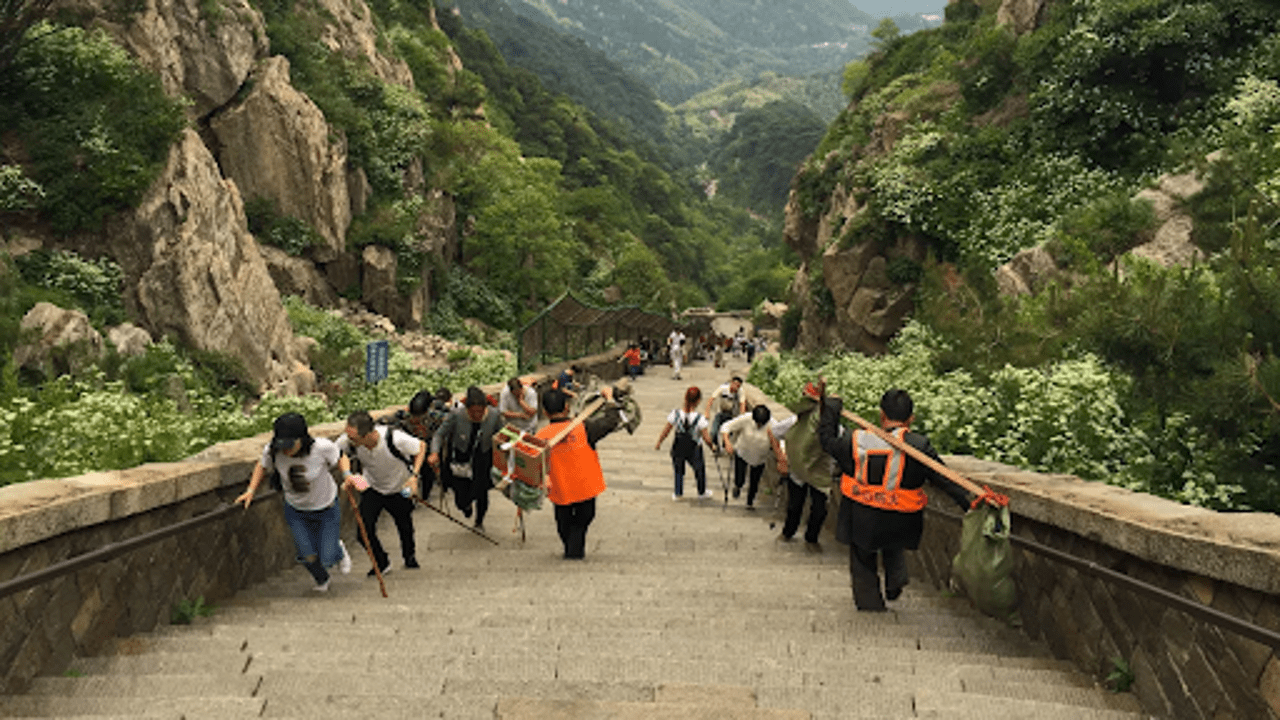
Visitors at Tai Mountain in Shandong province. Getty Images
Wendy Chen, a 25-year-old woman, was eager to climb Mount Tai, a famous peak in eastern China. However, she faced a challenge—finding someone to join her on the five-hour hike. Instead of canceling her plans, Wendy decided to hire a “climbing buddy” to help her reach the 5,000-foot summit. These climbing buddies, known as “pei pa,” are young men with outdoor experience who accompany people on mountain treks for a fee.
The “pei pa” trend has gained significant popularity in China this year. A hashtag related to these climbing buddies has already garnered over 100 million views on social media platforms. Typically, these young men, often university students or military veterans, advertise their services on platforms like Xiaohongshu and Douyin. They post details about their fitness, height, and hiking experience, and usually charge between 200 and 600 yuan (approximately $30 to $85) for each trip.
During the climb, these climbing buddies aim to keep their clients motivated and distracted from fatigue. They sing, tell jokes, play music, offer verbal encouragement, carry clients' backpacks, and even assist physically by holding hands or pulling them along the way.
Wendy’s adventure started at around 8:00 pm, so she could reach the summit in time for the breathtaking sunrise. After assessing her fitness level, her climbing buddy planned a moderate route and took on the responsibility of carrying her backpack. When they reached the peak and were hit by cold winds, her buddy rented a warm coat for her and led her to a sheltered area. He was also prepared with a national flag and props for a memorable sunrise photo, though Wendy thought his photography skills could improve. She rated her buddy as “satisfactory” for the price she paid—350 yuan (about $49).
While the service was typical in terms of cost, Wendy noted that the appearance of the climbing buddy could affect their rates. "Attractiveness is also part of their strength," she said, acknowledging that more good-looking climbers can charge higher fees.
Chen Wudi (left) pictured with a client during a climb.CNN
The main customers of climbing buddies are usually single young women, but this demographic
is slowly expanding. One viral video this summer showed a strong university student carrying a child up a steep mountain while the child's mother struggled to keep up.
For 20-year-old university student Chris Zhang, the climbing buddy gig has been a lucrative alternative to a traditional internship. Over the past three months, he has earned more than 20,000 yuan (about $2,800), which is far higher than the monthly wages of some classmates doing customer service internships. Zhang enjoys the flexibility and outdoor nature of the job compared to working behind a desk.
Others, like 27-year-old Chen Wudi, have taken the job full-time. After quitting a stressful sales position, Chen embraced his love for hiking and now works as a full-time climbing buddy. He takes on nearly 40 bookings per month, earning around 20,000 yuan ($2,800) monthly—double the average salary in China. Despite the good pay, Chen admits that the physical toll of the job, including knee pain, means he may only continue for a few more months.
The growing popularity of climbing buddies has raised concerns about safety. With no regulation in place, critics worry about the risks of unverified guides leading clients into dangerous situations, especially for young women or those with small children. Some have even reported cases of scams.
Still, with China's youth unemployment rate remaining high, many young people find becoming a climbing buddy a quick and profitable way to earn money while figuring out their long-term career paths. Chen Wudi understands this role may not last forever, but for now, it’s a good fit for him.















